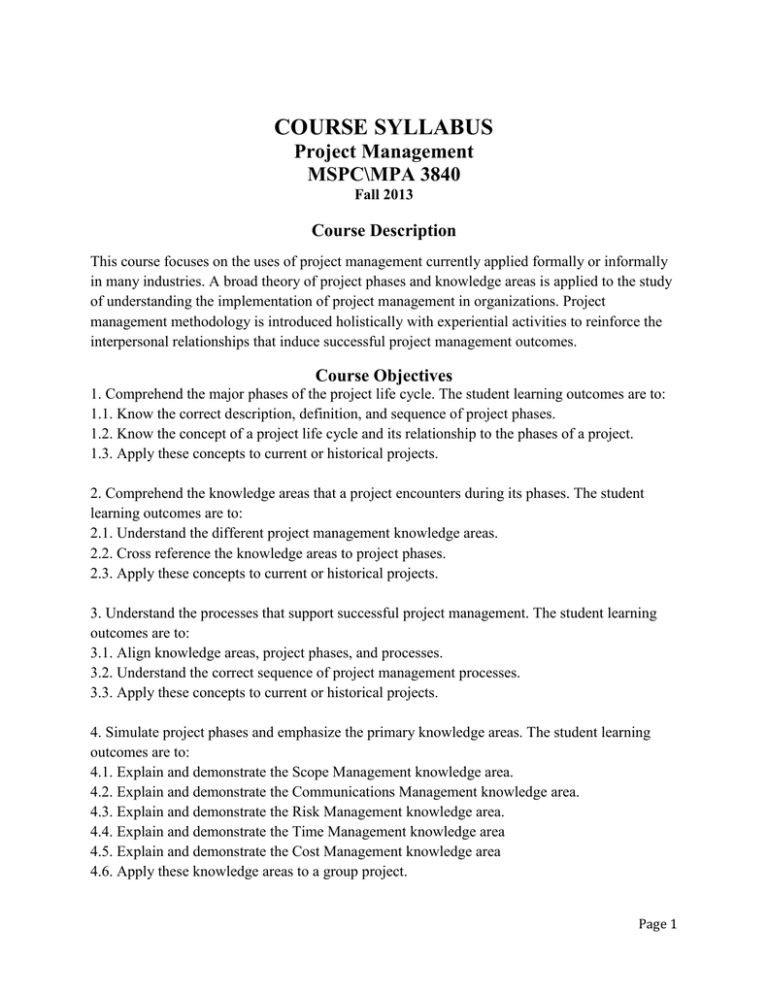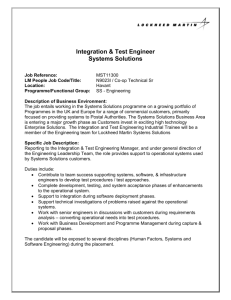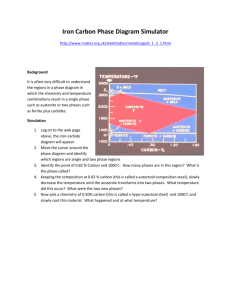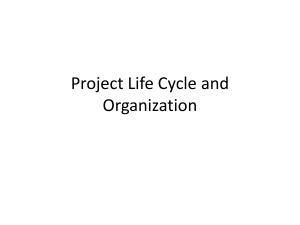This course focuses on the uses of project management currently
advertisement

COURSE SYLLABUS Project Management MSPC\MPA 3840 Fall 2013 Course Description This course focuses on the uses of project management currently applied formally or informally in many industries. A broad theory of project phases and knowledge areas is applied to the study of understanding the implementation of project management in organizations. Project management methodology is introduced holistically with experiential activities to reinforce the interpersonal relationships that induce successful project management outcomes. Course Objectives 1. Comprehend the major phases of the project life cycle. The student learning outcomes are to: 1.1. Know the correct description, definition, and sequence of project phases. 1.2. Know the concept of a project life cycle and its relationship to the phases of a project. 1.3. Apply these concepts to current or historical projects. 2. Comprehend the knowledge areas that a project encounters during its phases. The student learning outcomes are to: 2.1. Understand the different project management knowledge areas. 2.2. Cross reference the knowledge areas to project phases. 2.3. Apply these concepts to current or historical projects. 3. Understand the processes that support successful project management. The student learning outcomes are to: 3.1. Align knowledge areas, project phases, and processes. 3.2. Understand the correct sequence of project management processes. 3.3. Apply these concepts to current or historical projects. 4. Simulate project phases and emphasize the primary knowledge areas. The student learning outcomes are to: 4.1. Explain and demonstrate the Scope Management knowledge area. 4.2. Explain and demonstrate the Communications Management knowledge area. 4.3. Explain and demonstrate the Risk Management knowledge area. 4.4. Explain and demonstrate the Time Management knowledge area 4.5. Explain and demonstrate the Cost Management knowledge area 4.6. Apply these knowledge areas to a group project. Page 1 5. Develop communication abilities with particular emphasis on the sharing of lessons learned. The student learning outcomes are to: 5.1. Understand the importance of timely and recurring project progress reports. 5.2. Demonstrate effective and appropriate oral and textual communication in a group setting (face-to-face and on-line). 5.3. Apply these concepts to current or historical projects. 6. Develop skills using common Project Management tools. The student learning outcomes are to: 6.1. Use Spider Project software to augment class assignments. 6.2. Use Microsoft PowerPoint software to augment class assignments. 6.3. Use Microsoft Excel software to augment class assignments. 6.4. Use Microsoft Word software to augment class assignments. Reading materials REQUIRED TEXTS: 1. Clifford F. Gray and Erik W. Larson, Project Management, Current Edition, Irwin McGraw-Hill. 2. A Guide to The Project Management Body of Knowledge, PMBOK® Guide © 2004, Third Edition, Project Management Institute. ISBN # 1-930699-45-X ADDITIONAL TEXTS: 1. К. Хелдман. Профессиональное управление проектом. Пер. с англ. – М.: Бином. Лаборатория знаний,2005. 2. Арчибальд Р. Управление высокотехнологичными программами и проектами: Пер. с англ. – М.: ДМК Пресс, 2002. INTERNET RESOURCES: 1. Project Management Institute in Russia, http://www.pmi.ru/ 2. Russian Project Management Association "SOVNET", http://www.sovnet.ru 3. Project Management in Russia, http://www.aproject.ru/ 4. Professional in Project Management, http://www.pmprofy.ru/ 5. Project Management, http://www.pmsoft.ru/ 6. Preparing for PMP exam, http://www.pm-prepare.com/ 7. Spider Management Technologies, http://www.spiderproject.ru/ Page 2 Weekly Assignment Schedule DATE Class number TOPIC Hours 09\19 1. Introduction to Project Management 4 09\26 2. Project Integration Management 4 10\3 3. Using Spider Project Professional in Project Management 4 10\10 4. Project Risk Management 4 10\17 5. Project Scope Management 4 10\24 6. Project Resource Management 4 10\31 7. Project Cost Management 4 11\7 8. Project Time Management 4 11\14 9. Project Quality Management 4 11\21 10. Project Communications Management 4 11\28 11. Project Procurement Management 4 12\5 12. 4 12\12 13. Final Test and Consulting in Final Project Final Project Presentation (part I) 12\19 14. Final Project Presentation (part II) 4 4 Page 3 Grading Procedure (This will be explained in detail during the first class) 1. Participation in classes– 25% Attendance in class is required. Be on time. Turn off cell phones. Participate in discussions and exercises. 2. Intermediate and final tests – 25% Grade will be determined based on: Organization Spelling and grammar Utilization of course material This paper may be replaced by an in class multiple choice test. This will be decided and explained during Introduction. 3. Final project – 50%. Students will be assigned into groups and complete a project that includes both an inclass presentation and a written analytical paper (4-5 pages, good grammar and spelling and organization). Grading is based on the following factors: Organization of material Application of course content and material Utilization of outside course resources Creativity of class presentation When converting “letter grades” to “numeric grades (or visa versa), the following values will be used. Number to letter A+ A AB+ B BC+ C Failing 98-100 93-97 90-92 87-89 83-86 80-82 77-79 73-76 72 and below Letter to number 98 95 92 88 85 82 78 75 72 Page 4 Academic Policies Academic integrity is highly valued at Clark. Research, scholarship and teaching are possible only in an environment characterized by honesty and mutual trust. Academic integrity requires that your work be your own. Because of the damage that violations of academic integrity do to the intellectual climate of the University, they must be treated with the utmost seriousness and appropriate sanctions must be imposed. The maintenance of high standards of academic integrity is the concern of every member of the University community. Several ways in which academic integrity may be violated are outlined below. Cheating has three principal forms: 1. Unauthorized use of notes, text, or other aids during an examination or in performance of course assignments. 2. Copying the work of another. 3. Handing in the same paper for more than one course unless the faculty members involved give their explicit permission to do so. Plagiarism refers to the presentation of someone else’s work as one’s own, without proper citation of references and sources, whether or not the work has been previously published. Submitting work obtained from a professional term paper writer or company is plagiarism. Claims of ignorance about the rules of attribution, or of unintentional error are not a defense against a finding of plagiarism. Unauthorized collaboration refers to work that students submit as their own but which was arrived at through a process of collaboration without the approval of the professor. Since standards on appropriate or inappropriate collaboration may vary widely among individual faculty, students should make certain they understand a professor's expectations before collaborating on any class work. Alteration or fabrication of data includes the submission or changing of data obtained by someone else or not actually obtained in the performance of an experiment or study, except where allowed by the professor. It also includes the changing of data obtained in the performance of one's research. Page 5


